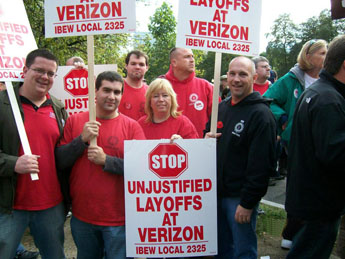New England Locals Challenge Verizon’s Layoffs
December 15, 2009
 As Verizon puts nearly 200 IBEW members on the street, mostly technicians assigned to fiber optic installation and service, locals are preparing to challenge the company’s decision in arbitration. As Verizon puts nearly 200 IBEW members on the street, mostly technicians assigned to fiber optic installation and service, locals are preparing to challenge the company’s decision in arbitration.
Verizon’s latest round of layoffs will affect members of seven IBEW locals in New England. Over 1,000 CWA members will also lose their jobs. While Verizon’s contract provides for retirement enhancements to be offered to workers deemed “surplus,” most of those affected lack the seniority and/or age to retire.
System Council T-6 Chairman Myles Calvey says Verizon only gave one day notice of the holiday season layoffs. And—for the first time—the still highly-profitable company didn’t assign some of the affected workers to work being performed by outside contractors before resorting to layoffs.
The company first declared a surplus of workers in late July, says Worcester, Mass., Local 2325 Business Manager Dave Keating, then “it’s like they flipped a switch and our work on FIOS (high-speed broadband) died.” Keating and other IBEW leaders launched a letter-writing campaign to Verizon and to members of the state legislature contending that Verizon was backing down on a commitment to spread broadband in the state. Some jobs were saved, but now Verizon is back for more. Says Keating:
Here’s a company making billions of dollars in profit that says it needs to lay off workers because it’s losing customers in the traditional telephone market. But they don’t say how many copper landlines have been replaced by FIOS that returns much higher rates. The workers still on the job are now busier than ever, while Verizon is still employing outside contractors.
Affected IBEW locals, members of System Council T-6, will challenge Verizon’s layoffs in arbitration, contending that the company is breaking a prior commitment to return contracted work to the bargaining unit before laying off union members.
Since most of the workers scheduled for layoffs were hired in 2006 and 2007, the company claims it owes them few obligations. However, in 2000 and 2003, layoffs were averted when the company agreed to return outsourced work of marking out electric and gas lines—prior to FIOS installation—to bargaining unit members who had been determined to be surplus.
Calvey has sent an information request to Verizon asking for details on all contractors currently employed by the company.
Local 2325 is taking a proactive stance toward future layoffs. The word is out that up to 60 recently hired linemen in Massachusetts and Rhode Island could be facing layoffs in January. But they are still needed to do work important to cities and towns.
Many municipalities are angry at Verizon’s practice of “double-poling,” installing new telephone poles, but leaving the older abandoned poles still standing. Instead of putting linemen on the street, says Keating, they should be retained to remove the unsightly poles. Local 2325 is lobbying for legislation to mandate such action.
Other locals affected by Verizon’s layoffs include Massachusetts Locals 2222 (Boston), 2321 (Middleton), 2322 (Middleboro), 2324 (Springfield); Manchester, N.H., Local 2320; Cranston, R.I., Local 2323.
Workers in former Verizon operations are also facing a devastating new round of layoffs. Near Albany, N.Y., 17 members of Syracuse Local 2213 who work for Idearc—formerly Verizon Yellow Pages—have been declared surplus. Most of them have between 10 and 20 years of seniority, says Business Manager Mary Jo Arcuri.
Since none of the Idearc workers have accepted or qualified for retirement incentives, they will be let go by Dec. 18. The workers have six months of medical benefits to get them through the winter months. After that, many, including workers in their 50’s, will have a difficult time finding new work, even though Albany has a stronger economy than most surrounding regions, says Arcuri.

|
 Related Articles
Related Articles